Director of Pandas Loved Animals Since Childhood
An interview with documentary filmmaker Drew Fellman.
Aug 13, 2018By: Lynn Barker
Pandas filmmaker Drew Fellman loves animals and has made several IMAX films documenting efforts to save those most endangered (Born to be Wild about orphaned orangutans and baby elephants and Island of Lemurs: Madagascar). Fellman has been fascinated with animals since childhood and tells us how we can also do things to help them.
In describing Pandas he says, “This film documents the first attempts to reintroduce giant pandas to their natural environment and that can take several years to really get right. It’s rough out there and animals need champions.”
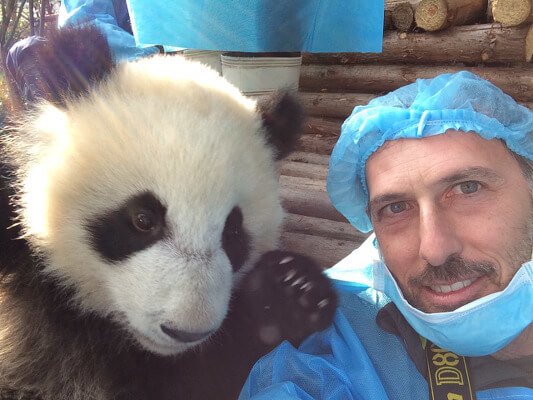 Drew Fellman with a giant panda at Chengdu BaseCourtesy of Warner Bros.
Drew Fellman with a giant panda at Chengdu BaseCourtesy of Warner Bros.
Filmmakers follow a panda named Qian Qian (pronounced Chen Chen), raised at China’s Chengdu Research Base and the efforts of scientists to release her back into the wild. The methods used were inspired by the work of “Papa Bear” (Ben Kilham), a black bear rehabilitator in New Hampshire, U.S.A. The IMAX film examines a truly cross-cultural effort to save some of the most endangered animals on Earth.
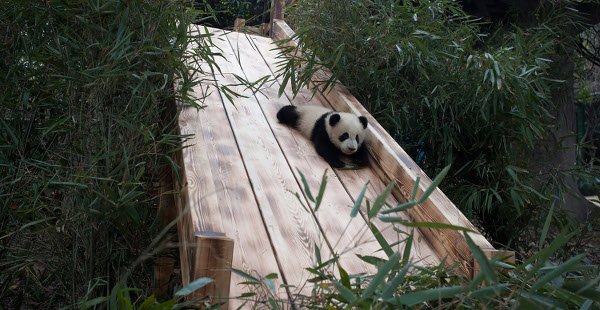 Pandas might have to slide down hills in the wildCourtesy of Warner Bros.
Pandas might have to slide down hills in the wildCourtesy of Warner Bros.
Kidzworld: Did you and your crew try to stay hidden to get the footage or did you make friends with the pandas first?
- Drew: Well, with the little pandas, we could be friendly with them. They’re curious and they’re with people all day long. They love whatever’s new and with the same with the black bears too. Whatever’s new, they’re curious about it whether it’s a log or a pen, doesn’t matter. They’re all over it. But when Qian Qian was older we would set up remotely and be thirty or forty feet away looking through monitors and operating the camera by cables and also with (black bear) Squirty, operating remotely. A grown black bear, they’re not interested in people. They want to be around bears and do bear things and you just get in the way of that.
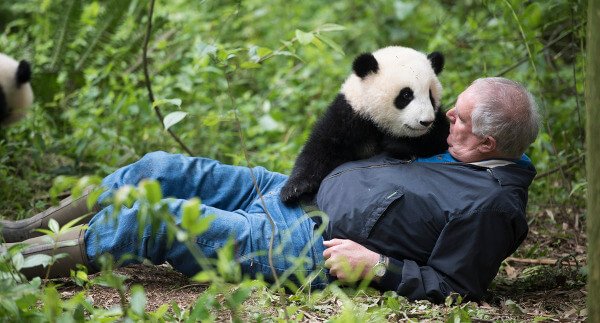 Papa Bear meets a pandaCourtesy of Warner Bros.
Papa Bear meets a pandaCourtesy of Warner Bros.
Kidzworld: Ben Kilham, the guy called Papa Bear is amazing with the black bears.
- Drew: He really knows his stuff. He’s very, very intuitive. How could he possibly know what that bear is going to do and is thinking but if you are as astute to the emotions of bears as he is, you really pick it up. I had been talking to him since 2009 about doing something together. It’s amazing to watch him with bears.
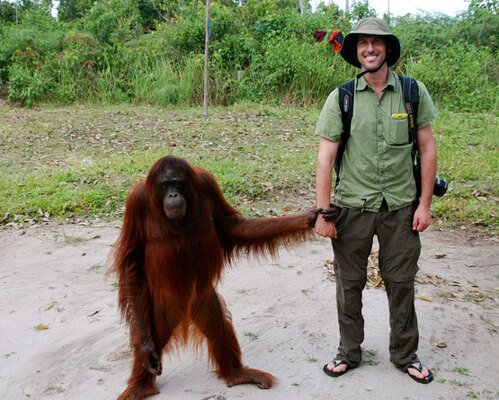 Drew Fellman with orangutan friendCourtesy of Warner Bros.
Drew Fellman with orangutan friendCourtesy of Warner Bros.
Kidzworld: Did you write your basic script before shooting or get all the footage and form a script around it?
- Drew: IMAX has a much more elaborate production process. We’re shooting in 3D we have big cameras and lots of people. It’s more working out the story and the sequences we need to tell that story and be adaptable to change that as events change. The actual script is one of the last things we do. We research for a couple of years and do interviews with everybody. It’s like an improvisation in many ways. You know what your intention is but it changes and you go with it.
 Actress Kristin Bell narrates PandasCourtesy of Warner Bros.
Actress Kristin Bell narrates PandasCourtesy of Warner Bros.
Kidzworld: How did you get Kristen Bell interested in narrating?
- Drew: We just asked her. We showed her the footage and she really loved it. It really spoke to her. She’s a big animal rights supporter. She’s really connected.
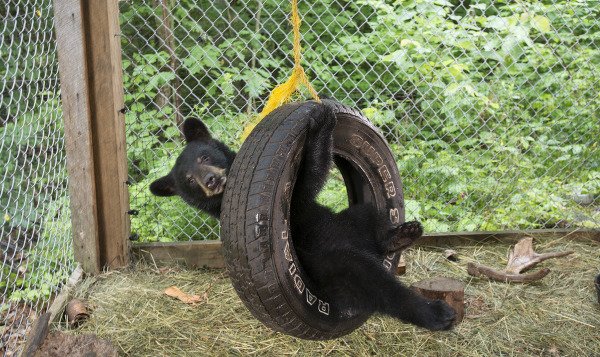 A black bear cub at Kilham (Papa Bear's) research centerCourtesy of Warner Bros.
A black bear cub at Kilham (Papa Bear's) research centerCourtesy of Warner Bros.
Kidzworld: Did you personally pick the music? It is totally matched to the action and lots of fun.
- Drew: We have a composer who does the score and picks the songs. It’s a process. There are lots of musicians and they all have different opinions (about what to use).
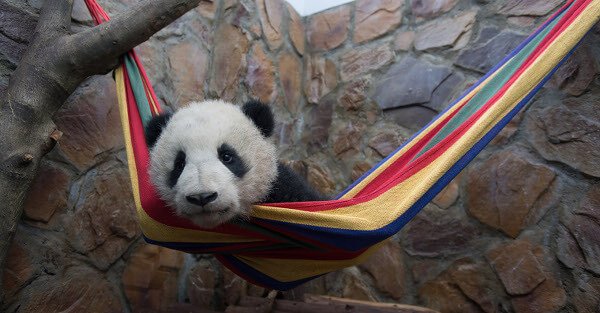 Panda living the good life at Chengdu Panda BaseCourtesy of Warner Bros.
Panda living the good life at Chengdu Panda BaseCourtesy of Warner Bros.
Kidzworld: Why are you drawn to make documentaries about endangered species? Did this attraction to helping animals start when you were a kid or teen?
- Drew: As a kid I was always fascinated with animals and you would find me in front of the TV watching “Wild Kingdom” (An American television show). I think the thing I’m most interested in is all the work these people are doing around the world to counteract the ill that Men have caused animals. I’m always interested in people working toward solving the problems. I’m fascinated by the people that take on that mission and dedicate their lives to it. It’s rough out there and animals need champions.
 Wildlife Conservation Biologist with panda cubCourtesy of Warner Bros.
Wildlife Conservation Biologist with panda cubCourtesy of Warner Bros.
Kidzworld: What was the most challenging scene or sequence and why?
- Drew: Any time we were working with the adult Qian Qian was very difficult because she really is just gonna do what she wants to do. It’s a very strange choreography we have to go through. We have to set up our dream scenario. Okay, we’re going to be here. Qian Qian will come down the hill and she’s going to do this. We set up for that and hope for the best and be very flexible to change at the last minute. We’d have to hike for hours and set up in a place. It would be a whole day commitment for a little piece of footage. The hardest things don’t work and aren’t in the movie. It was hard to get her to feast on big stalks of bamboo, to get on her hind legs and pull them down. She would just sit down and eat smaller shoots we would give her.
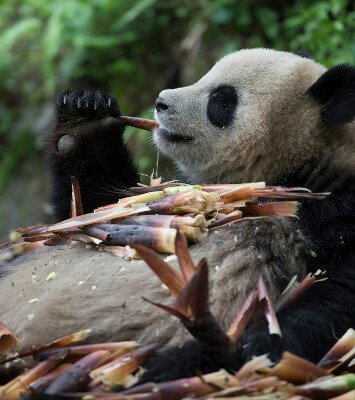 Panda eats bamboo before release to the wildCourtesy of Warner Bros.
Panda eats bamboo before release to the wildCourtesy of Warner Bros.
Kidzworld: I assume that documentary filmmakers aren’t supposed to interfere with what is unfolding before them but aren’t you tempted to dump the camera and jump in to help when an animal is injured etc.?
- Drew: That’s a deep question. There is the idea that you are just there to watch events unfold and some people could say that but I don’t see the point of that. It doesn’t resonate with my life at all. But, in this movie you are watching people working to save Qian Qian, We’re not watching people not trying to save her. That footage of her rescue was actually shot by her rescue team. We weren’t there then.
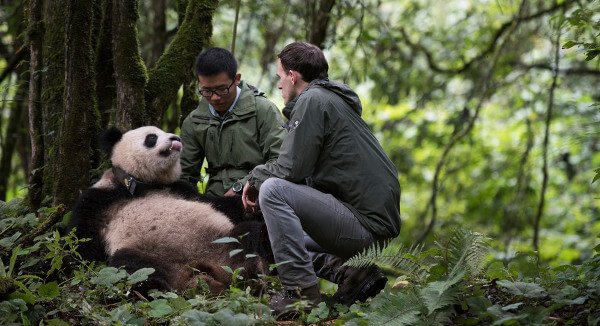 Scientists work with adult Qian QianCourtesy of Warner Bros.
Scientists work with adult Qian QianCourtesy of Warner Bros.
Kidzworld: It was amazing the team found her stuck in a tree way out in the middle of nowhere.
- Drew: Yeah. We worked closely with the science team. Our drone (camera) team started a collaboration with them to design a drone platform so they can get the signal (from the animal’s tracking collar) right away and pinpoint the location. In those mountains, the collar tries to send a signal and it’s very difficult to find where it’s coming from. The terrain is so difficult it takes a long time to find where the panda is. Now they can send up a drone, get the signal and pinpoint the location immediately. This can go a long way toward saving panda lives.
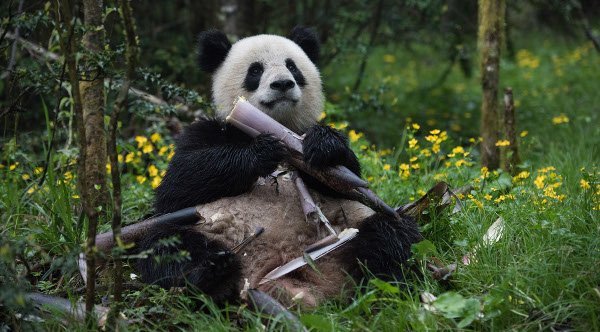 Adult Qian Qian eating bambooCourtesy of Warner Bros.
Adult Qian Qian eating bambooCourtesy of Warner Bros.
Kidzworld: What message would you hope tweens and teens would take home from the film?
- Drew: One is that conservation is real work. It’s something where you have to wake up really early in the morning to do and you spend a lot of time outdoors. If you want to really make a difference in the world for wildlife, it’s completely possible. There is lots of opportunity but it’s really hard work. It’s also a path open to everybody. You can become a scientist and learn about the world around you. Ben (known as Papa Bear) grew up dyslexic. He was unable to do well in school and had a learning disability his whole life. But he was so committed to the world around him and helping bears that he created this whole life for himself and was able to make a difference for one of the most endangered animals in the world.
- Another message is just the importance of collaboration; scientists from the U.S. and China working together to do whatever they can that is best for pandas. It doesn’t matter where they come from, they work together to make the world a better place. This is very inspiring. They aren’t trying to get the edge on each other.
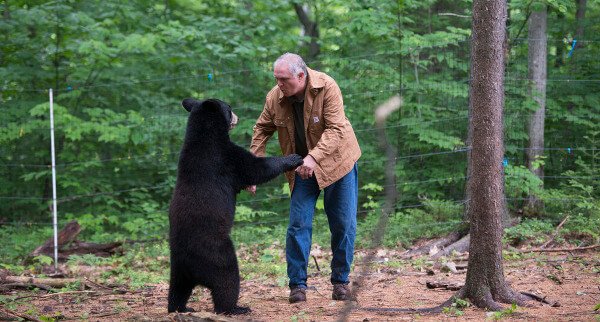 Ben Kilham (Papa Bear) with orphaned black bear cubCourtesy of Warner Bros.
Ben Kilham (Papa Bear) with orphaned black bear cubCourtesy of Warner Bros.
Kidzworld: How can young people especially help endangered species?
- Drew: The important thing is to learn to appreciate the wildlife around you and to appreciate the natural world and grow up with a respect for nature and an appreciation of the emotional lives and the minds of animals. Ask how can we all learn to live in a way in which pandas won’t need saving. Learn to think of animals as precious collaborators on Earth. Everybody knows their dog has feelings, so do other animals.
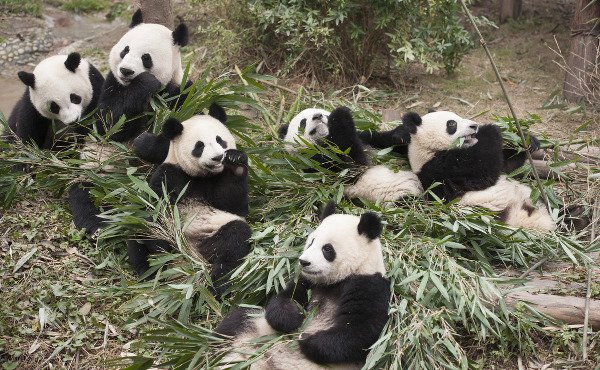 Pandas galore at Chengdu Panda BaseCourtesy of Warner Bros.
Pandas galore at Chengdu Panda BaseCourtesy of Warner Bros.
See Pandas on IMAX screens starting August 17th!
Have Your Say
Do you think you have what it takes to be a scientist or conservationist working to save endangered animals? Are pandas one of your fave animals? What do you think humans should do to make Earth a better place for all animals? Comment below.

































